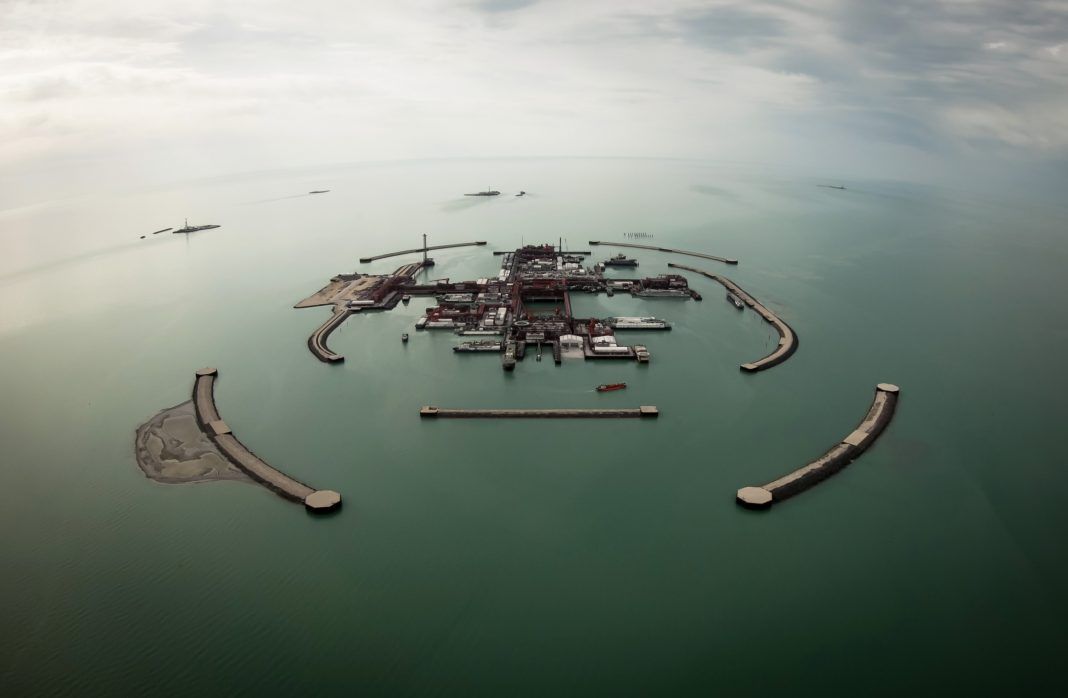Iranians online have expressed concerns over the impact that a convention signed by the Iranian government in 2018 might have on Iran’s rights of ownership in the so-called Caspian basin.
Fears that the Islamic Republic ceded the majority of Iran’s share in the waterway to the four other signatories — Russia, Azerbaijan, Kazakhstan and Turkmenistan — were stoked after Russia’s Deputy Foreign Minister Grigory Karasin suggested that Moscow had made deals with other parties at Iran’s expense.
[aesop_image img=”https://kayhanlife.com/wp-content/uploads/2019/08/2018-08-12T181314Z_581775844_UP1EE8C1EM2PW_RTRMADP_3_KAZAKHSTAN-CASPIAN.jpg” panorama=”off” align=”center” lightbox=”off” captionsrc=”custom” caption=”FILE PHOTO: Iranian President Hassan Rouhani, Azeri President Ilham Aliyev, Kazakh President Nursultan Nazarbayev, Russian President Vladimir Putin and Turkmen President Kurbanguly Berdymukhamedov walk on the embankment of the Caspian Sea following the Fifth Caspian Summit in Aktau, Kazakhstan August 12, 2018. REUTERS./” captionposition=”center” revealfx=”off” overlay_revealfx=”off”]
Analysts say the convention could confer enormous benefits to Russia and the three former Soviet states, who may be viewing it as a gateway to commercial opportunities in the Caspian basin. Iran could potentially find it harder to make deals as sanctions continue to restrict the country’s trade, and could lose at least US $3.2 trillion in revenues if Russia tries to press its advantage.
Problems moving forward with the convention could arise because the precise legal status of the Caspian Sea is not clearly defined, analysts explain. The lack of clarity within the convention may have been intentional, said Ziyad Ziyadzade, the author of “Drilling for Black Gold: The Demarcation for Hydrocarbon Resources in the Caspian Sea” and a corporate associate at Kirkland & Ellis LLP, in an interview with Kayhan Life.
“The nuances of ownership will still need to be determined by the parties based on the convention document, which some have deemed to be ‘vague’ on purpose. Of significance is that the parties appear to have postponed the actual split of the fossil-fuel rich subsoil territory, leaving it to the states to decide the partition amongst themselves,” he said.
The Convention on the Legal Status of the Caspian Sea defines the five Caspian littoral states’ rights and obligations in the Caspian basin — including its waters, seabed, subsoil, natural resources and airspace directly above the waters. The agreement grants territorial jurisdiction of up to 15 nautical miles to each of the five states bordering on the basin.
Responding to public criticism that the Iranian government had signed away the country’s rights to the waters and its resources, Iran’s Foreign Ministry spokesman Abbas Mousavi said on August 4 that the deal had not been finalized and that no new developments had taken place.
Iran previously shared equal ownership rights with Russia over the body of water. Unofficial reports suggested that the country’s share of the waters had diminished from 50 percent to 11 percent after the agreement was signed.
[aesop_image img=”https://kayhanlife.com/wp-content/uploads/2019/08/2019-05-27T000000Z_295450466_RC128A1B7700_RTRMADP_3_SOCCER-EUROPA-CHE-ARS-PREVIEW.jpg” panorama=”off” align=”center” lightbox=”off” captionsrc=”custom” caption=”FILE PHOTO: An aerial view of the Caspian Sea near the city of Baku, May 27, 2019. REUTERS/Amr Abdallah Dalsh” captionposition=”center” revealfx=”off” overlay_revealfx=”off”]
While the convention refers to the Caspian basin as a sea, the legal position remains unclear, and could affect the outcome of future negotiations. As a sea, the waterway would fall under the United Nations Convention on the Law of the Sea, which allows countries beyond those bordering on the waterway to make a claim on its resources. As a lake, the basin must be divided equally between the bordering states only.
By the terms of the convention, while the surface of the water is treated as a sea, the seabed and its profitable mineral deposits are not clearly defined, leaving them subject to bilateral agreements between the participating states.
On August 6, Russia confirmed that it would be sending at least 10 companies to an economic forum in Turkmenistan on expanding trade and investment in the Caspian region. The forum marks the one-year anniversary of the Convention on the Legal Status of the Caspian Sea. Iranian officials and entrepreneurs are also attending the forum.
[aesop_image img=”https://kayhanlife.com/wp-content/uploads/2019/08/2013-09-04T120000Z_1245999443_GM1E9941MJE01_RTRMADP_3_KAZAKHSTAN.jpg” panorama=”off” align=”center” lightbox=”off” captionsrc=”custom” caption=”FILE PHOTO: An aerial view shows artificial islands on Kashagan offshore oil field in the Caspian sea, western Kazakhstan. REUTERS./” captionposition=”center” revealfx=”off” overlay_revealfx=”off”]
Beyond concerns that the convention has reduced Iran’s ownership status in the Caspian basin, some experts believe the most important provisions of the convention relate to military restrictions in the waters. The provisions, contained in Article 3 of the convention, could offer the littoral states a strategic advantage in the region: the convention allows only armed forces belonging to signed up parties to enter and sail across the Caspian basin.
[aesop_image img=”https://kayhanlife.com/wp-content/uploads/2019/08/2015-12-26T120000Z_665312949_GF10000276419_RTRMADP_3_RUSSIA-PUTIN-DEFENCE.jpg” panorama=”off” align=”center” lightbox=”off” captionsrc=”custom” caption=”FILE PHOTO: Russian warships are seen during a military parade. REUTERS/Sergei Krasnoukhov” captionposition=”center” revealfx=”off” overlay_revealfx=”off”]
Unease over the Iranian government’s decision to agree to the convention has led to the launch of a social media campaign by supporters of Prince Reza Pahlavi, who has also called on Iranians to question the convention’s terms. The Prince told his Iranian followers on Twitter: “Stand up and protect the country’s national interests by forcing members of Iran’s parliament to defend the people’s rights and prevent history from repeating itself.”
[aesop_image img=”https://kayhanlife.com/wp-content/uploads/2019/08/2004-12-09T000000Z_1233427984_RP5DRIAQAIAA_RTRMADP_3_IRAN.jpg” panorama=”off” credit=”FILE PHOTO: An Iranian water taxi driver starts his engine in water off the southern coast of the Caspian Sea in Bandar Turkoman. REUTERS./” align=”center” lightbox=”on” captionsrc=”custom” captionposition=”center” revealfx=”off” overlay_revealfx=”off”]
| [amo_member id=”110708″ item-width=”250″ align=”left” item-margin=”20″ full-width=”yes” panel=”right”] |


